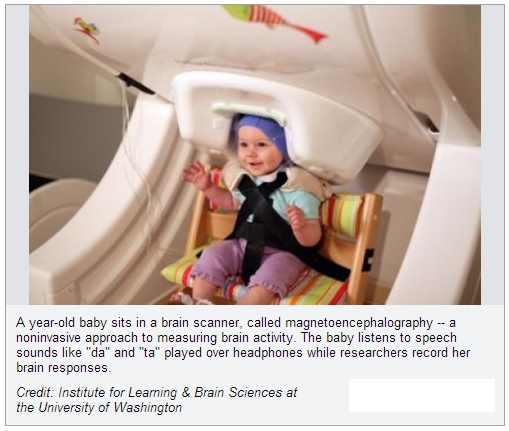Months Before Their First Words, Babies' Brains Rehearse Speech Mechanics
[Source: Science Daily]

Infants can tell the difference between sounds of all languages until about 8 months of age when their brains start to focus only on the sounds they hear around them. It’s been unclear how this transition occurs, but social interactions and caregivers’ use of exaggerated “parentese” style of speech seem to help.
University of Washington research in 7- and 11-month-old infants shows that speech sounds stimulate areas of the brain that coordinate and plan motor movements for speech.
The study, published July 14 in the Proceedings of the National Academy of Sciences, suggests that baby brains start laying down the groundwork of how to form words long before they actually begin to speak, and this may affect the developmental transition.
“Most babies babble by 7 months, but don’t utter their first words until after their first birthdays,” said lead author Patricia Kuhl, who is the co-director of the UW’s Institute for Learning and Brain Sciences. “Finding activation in motor areas of the brain when infants are simply listening is significant, because it means the baby brain is engaged in trying to talk back right from the start and suggests that 7-month-olds’ brains are already trying to figure out how to make the right movements that will produce words.”
PediaStaff is Hiring!
All JobsPediaStaff hires pediatric and school-based professionals nationwide for contract assignments of 2 to 12 months. We also help clinics, hospitals, schools, and home health agencies to find and hire these professionals directly. We work with Speech-Language Pathologists, Occupational and Physical Therapists, School Psychologists, and others in pediatric therapy and education.
